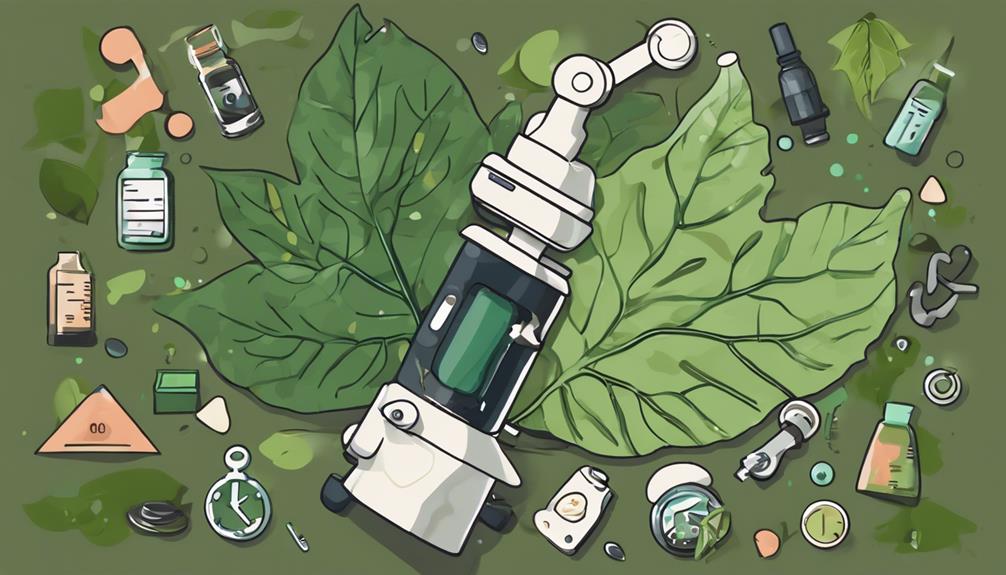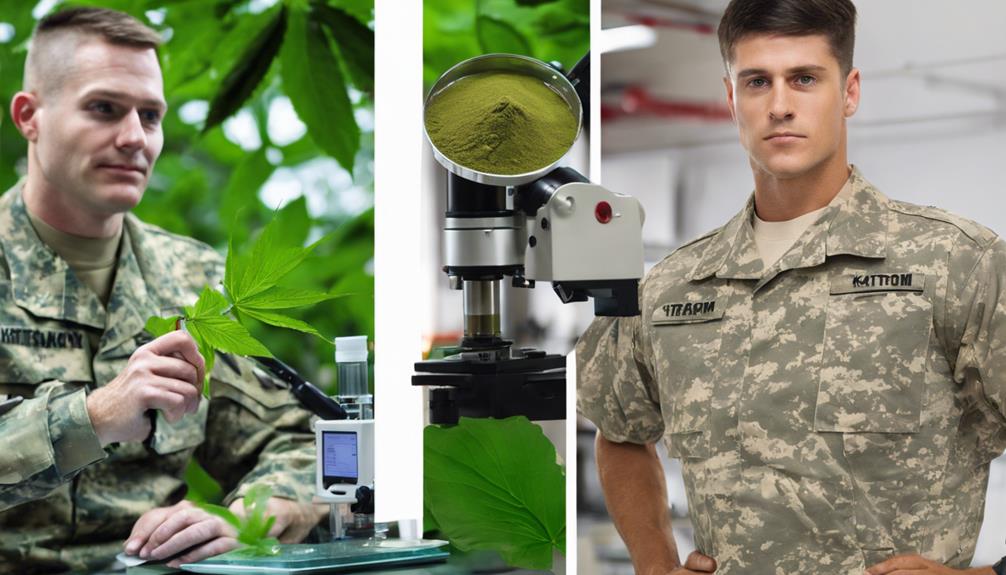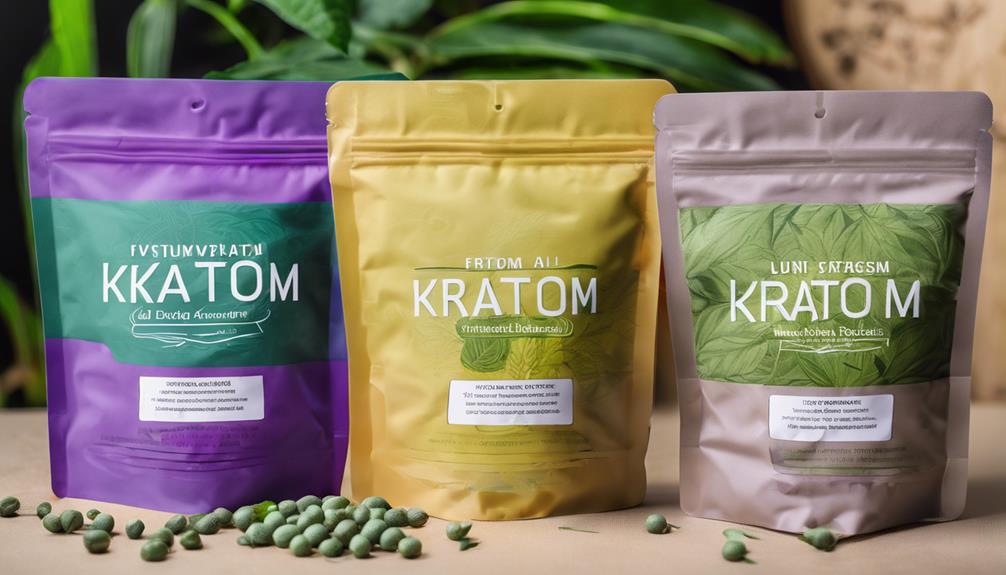As a military service member, you need to know that while kratom won't trigger a positive result in standard military drug tests, its use is still strictly prohibited and can lead to disciplinary action due to its potential harm to your health and well-being. Despite not showing up on routine drug tests, kratom's active alkaloids can be detected using specialized laboratory tests, such as GC-MS and LC-MS-MS. If you're considering using kratom, you must understand the risks and consequences. There's more to learn about kratom's complex legal status, detection methods, and potential risks – and grasping the full picture is vital.
Key Takeaways
- Kratom won't trigger a positive result in standard military drug tests, but its use is still prohibited for military service members.
- Military policy prohibits kratom use to protect service members from potential harm, despite it not being detectable in standard drug tests.
- Specialized laboratory tests, such as GC-MS and LC-MS-MS, can detect kratom's active alkaloids in urine, blood, or hair samples.
- Factors like dose, frequency, body composition, and individual metabolism affect the likelihood of detecting kratom metabolites in biological samples.
- Kratom use can lead to disciplinary action for military personnel, emphasizing the importance of prioritizing health and well-being.
Kratom Detection in Military Tests

When you take a routine DoD drug test, kratom won't trigger a positive result, as it's not a detectable substance in standard military drug tests. This means that if you've used kratom, you won't fail a drug test just because of it. However, don't think you're in the clear just yet. Despite not producing a positive result, kratom use is still prohibited for military service members. The reason for this prohibition lies in the potential risks associated with kratom use, including drug dependency and other safety concerns.
It's essential to understand that the military takes a strict stance on kratom use, and it's not just about passing a drug test. The prohibition aims to protect service members from the potential harm that kratom can cause. So, even though kratom won't produce a positive result on a routine drug test, it's still important to avoid using it altogether. Remember, as a military service member, you're expected to adhere to the rules and regulations, and kratom use is strictly prohibited.
Understanding Kratom's Legal Status
As you navigate the complex landscape of kratom use, you must understand that kratom's legal status is a patchwork of varying regulations and bans across the U.S. and globally. Kratom is not a controlled substance, but it's considered a drug of concern by the DEA. Currently, its legal status varies by state and local jurisdiction, with some states banning it, while others regulate it through laws like the Kratom Consumer Protection Act (KPCA).
Here are some key points to consider:
- Kratom is legal at the federal level, but its legal status is subject to change as it's being monitored by the DEA and FDA.
- Some states have banned kratom, while others permit it for therapeutic purposes.
- The FDA warns against kratom use, citing concerns over addiction, abuse, and health risks.
- Kratom is available as a dietary supplement, but the FDA has taken action against kratom-containing supplements.
Understanding kratom's legal status is crucial, as it affects its availability, regulation, and use. As you explore kratom use, stay informed about the legal landscape to ensure you're making informed decisions.
FDA's Stance on Kratom Use

As you explore the FDA's stance on kratom use, you'll find that the agency has taken a firm position against the substance. The FDA has explicitly warned consumers against using kratom, citing its potential for addiction and abuse, as well as its unapproved status for medical use. You'll discover that the FDA's regulatory role is critical in understanding the complexities surrounding kratom's legal status.
Kratom's Legal Status
You're likely aware that the FDA has not approved kratom for medical use, and its legal status varies widely depending on the country. This lack of standardization can lead to confusion, especially for those who use kratom as a supplement or for therapeutic purposes.
Here are some key points to consider regarding kratom's legal status:
- Kratom is not a controlled substance in the US, but the FDA warns against its use in dietary supplements due to concerns over potential addiction and health risks.
- The FDA exercises jurisdiction over kratom as an unapproved drug, taking action against kratom-containing supplements.
- Kratom policy is complex, with debates surrounding its legal status and potential therapeutic use.
- Further research is needed to inform policy decisions on kratom's safety and efficacy.
Understanding kratom's legal status is crucial, especially for those in the military, where drug testing is a regular occurrence. As you navigate the complexities of kratom use, it's essential to stay informed about its legal implications.
FDA's Regulatory Role
Given the FDA's jurisdiction over kratom as an unapproved drug, understanding the agency's stance on kratom use, particularly in the context of dietary supplements, is vital. As you explore the world of kratom, you should know that the FDA has exercised its authority over kratom, taking action against kratom-containing dietary supplements. The agency warns consumers not to use kratom, as it is not approved for use in dietary supplements. In fact, kratom products have been found to be contaminated with opioids, heroin, benzodiazepines, cocaine, heavy metals, and salmonella, leading to FDA warnings and actions. The FDA has classified kratom as a 'drug of concern' due to its potential for abuse and addiction. Importantly, the FDA has not approved kratom for any medical use, and its legal status varies by country. As you consider kratom use, especially in the context of drug testing, you must understand the FDA's stance.
Types of Drug Tests for Kratom
When it comes to detecting kratom use, several types of drug tests can be employed, ranging from specialized laboratory tests to more advanced analytical techniques. As a service member, you must understand the different types of drug tests that can detect kratom use.
Several types of drug tests can detect kratom:
- Gas Chromatography-Mass Spectrometry (GC-MS): This test can detect kratom's active alkaloids, including mitragynine and 7-hydroxymitragynine, in urine samples.
- Liquid Chromatography-Tandem Mass Spectrometry (LC-MS-MS): Similar to GC-MS, this test can also detect kratom's active alkaloids in urine samples.
- Kratom-Specific Tests: Some drug testing laboratories offer kratom-specific tests that can detect the presence of kratom alkaloids in urine, blood, or hair samples.
- Routine Drug Tests: While kratom won't produce a positive result on a routine DoD drug test, military service members are still prohibited from using kratom due to its potential for drug dependency and other safety concerns, so you must be aware of this policy.
Factors Affecting Kratom Detection

When considering kratom detection, you should be aware that several factors can influence the outcome. The amount of time kratom's metabolites remain in your system, the amount and frequency of kratom use, and your individual body composition all play a role in determining whether kratom will be detected in a drug test. Understanding these factors is essential to anticipating the likelihood of a positive test result.
Metabolite Half-Life Matters
Your kratom use can be detected for an extended period due to the unique half-lives of its metabolites, which play a key role in determining the window of detection in drug tests. The main active ingredient, mitragynine, has a half-life of approximately 23-40 hours, affecting how long it can be detected in your body. However, the 7-hydroxy mitragynine metabolite, a key indicator of kratom use, has a shorter half-life of around 6-10 hours, making it a more challenging target for drug tests.
- Mitragynine's half-life: 23-40 hours, influencing the detection window.
- 7-Hydroxy mitragynine's half-life: 6-10 hours, making it a more elusive target.
- Individual factors: Body weight, age, kidney and liver function affect kratom's metabolism and elimination.
- Detection times: Specialized tests can detect kratom metabolites in urine for up to 7-10 days and in hair for up to 3 months.
Understanding these factors is essential in determining the likelihood of kratom detection in drug tests. By recognizing the impact of metabolite half-lives, you can better comprehend the complexities of kratom detection.
Dose and Frequency Impact
The amount and frequency of kratom consumption substantially influence detection, as higher doses and repeated use increase the likelihood of metabolites being present in your system during a drug test. If you're a regular kratom user, you're more likely to test positive due to the accumulation of metabolites in your body. Your routine kratom dose and frequency of use play a significant role in determining the duration of metabolite presence. A higher dose of kratom will result in more metabolites being produced, which can lead to a longer detection window. Similarly, frequent kratom use can cause metabolites to build up in your system, making it more likely for you to test positive. Even if you've stopped using kratom, residual metabolites can still be detected if you've been using it regularly. Understanding the impact of dose and frequency on kratom detection is essential in anticipating the likelihood of a positive drug test result.
Body Composition Affects
As you consider the factors that influence kratom detection, recognize that your body composition plays a vital role in how long kratom metabolites remain in your system. Your body's ability to process and eliminate kratom is influenced by various physiological factors, which can impact the duration of kratom's presence in your body.
Four key aspects of body composition that affect kratom detection are:
- Body fat percentage: Kratom metabolites tend to accumulate in fatty tissues, which can prolong their presence in your system.
- Metabolic rate: A faster metabolism can help eliminate kratom metabolites more quickly, reducing the detection window.
- Hydration level: Adequate hydration can aid in the excretion of kratom metabolites, while dehydration can slow down this process.
- Liver and kidney function: The efficiency of your liver and kidneys in processing and eliminating kratom metabolites can substantially impact the detection window.
Understanding how your body composition affects kratom detection is essential in anticipating the outcome of a routine drug test, especially for military personnel who may be subject to opioid testing. By acknowledging these factors, you can better prepare for a drug test and take necessary precautions to guarantee a clean result.
Kratom's Presence in Biological Samples
Most drug tests, including those used by the military, detect kratom's presence in biological samples, such as urine, blood, or hair, by identifying specific alkaloids, like mitragynine and 7-hydroxymitragynine. As you're likely aware, these alkaloids are unique to the Mitragyna speciose plant, which kratom is derived from. When you ingest kratom, these alkaloids are absorbed into your bloodstream and eventually make their way into your biological samples.
The detection of kratom in drug tests is often achieved through techniques like gas chromatography-mass spectrometry (GC-MS) or liquid chromatography-tandem mass spectrometry (LC-MS/MS). These methods allow testers to identify the specific alkaloids present in your biological samples, which can indicate kratom use. You should be aware that the detection window for kratom in biological samples varies depending on the type of sample and the sensitivity of the test. For instance, kratom may be detectable in urine for up to a week, while in hair, it can be detected for several months.
Workplace Implications of Kratom Use

Since you're likely employed in a high-stress profession like the military, you should be aware that kratom use can have significant workplace implications. As a military personnel, you're prohibited from using kratom, and failure to comply may result in disciplinary action. The military emphasizes the importance of prioritizing your health and well-being, and kratom use can lead to drug dependency and other health risks.
- Prohibited substance: Kratom use is prohibited for military personnel, and its detection may lead to disciplinary action.
- Health risks: Kratom use can lead to drug-induced liver injury and unintentional drug overdose deaths, highlighting the need for public health officials to take action.
- Disciplinary action: Failure to comply with the prohibition may result in disciplinary action, emphasizing the importance of prioritizing your health and well-being.
- Prioritizing health: Education and awareness are key to preventing substance abuse, and you're encouraged to prioritize your health and well-being by avoiding kratom use, keeping the following key implications in mind.
What Are the Consequences of Failing a Military Drug Test for Kratom?
Failing a military testing for kratom can have serious consequences, including disciplinary action, loss of rank, and possible discharge from the military. Kratom is considered a prohibited substance by the military, and failing a drug test for it can result in significant career repercussions for service members.
State-by-State Kratom Legality
While kratom is legal to consume in the U.S., its legality varies substantially from state to state, with some states having implemented outright bans, while others have established their own regulations and restrictions on its sale and consumption. As you navigate the complex landscape of kratom legality, understanding the specific laws in your state or local jurisdiction is vital. Currently, six states – Alabama, Arkansas, Indiana, Rhode Island, Vermont, and Wisconsin – have prohibited kratom, while 11 states have passed the Kratom Consumer Protection Act (KPCA) to establish standardized regulations. Some cities, like Zachary in Louisiana, are planning to ban kratom, while others have implemented their own regulations. Southeast Asia, the native region of kratom, is not the only place where its legality is debated. In the U.S., kratom's legal status depends on where you live. Staying informed about the laws in your area is necessary to avoid unknowingly breaking the rules. By grasping the state-by-state legality of kratom, you can make informed decisions about your use.
Frequently Asked Questions
Can I Use Kratom While on Active Duty Without Consequences?
"Back in the day, a 'powdered wig' like you would've been hung for even thinking about using substances on duty. Fast forward to today, as an active service member, you're wondering if you can get away with using kratom without consequences. Sorry to break it to you, but Military Benefits come with strings attached. Service Members are bound by Duty Restrictions, and Command Policy explicitly prohibits the use of kratom. Don't risk it, or you might find yourself court-martialed, and that's not a fate you want to face."
Will a One-Time Kratom Use Show up on a Military Drug Test?
If you've used kratom just once, you're probably wondering if it'll show up on a drug test. Here's the deal: kratom's metabolites can linger in your system for a few days, but the risk of detection is low. However, military policy is strict, and even a false positive can have serious consequences. Be aware that some drug tests may flag kratom's alkaloids, leading to a false positive for opioids. Consider the risks before using kratom – it's not worth jeopardizing your military career.
Can Kratom Be Detected in a Hair Follicle Drug Test?
As you venture into the world of drug testing, a tangled web of uncertainty unfolds. Can kratom's subtle presence be unraveled in a hair follicle drug test? The answer lies in the sphere of hair analysis, where detection windows stretch far beyond the fleeting whispers of a single use. With follicle testing, drug sensitivity is heightened, and kratom's alkaloids can linger, leaving behind a detectable trail.
How Long Does Kratom Stay in Your System for Drug Testing?
As you wonder how long kratom stays in your system for drug testing, you need to understand its elimination process. Kratom's half-life is around 23-40 hours, but its metabolites can linger. Metabolite detection in urine depends on factors like urine pH levels, which affect the elimination rate. Typically, kratom can be detected in urine for 3-7 days after last use, but this window may vary depending on individual factors and testing methods.
Are There Any Military-Approved Kratom Detox Products Available?
When seeking military clearance, you're likely wondering if there are military-approved kratom detox products available to help you pass a drug test. Unfortunately, there aren't any products specifically endorsed by the military for kratom detox. However, you can explore herbal remedies and detox methods that have garnered positive product reviews. Look for natural supplements that facilitate the body's natural cleansing process, and always consult with a medical professional before using any detox products.










